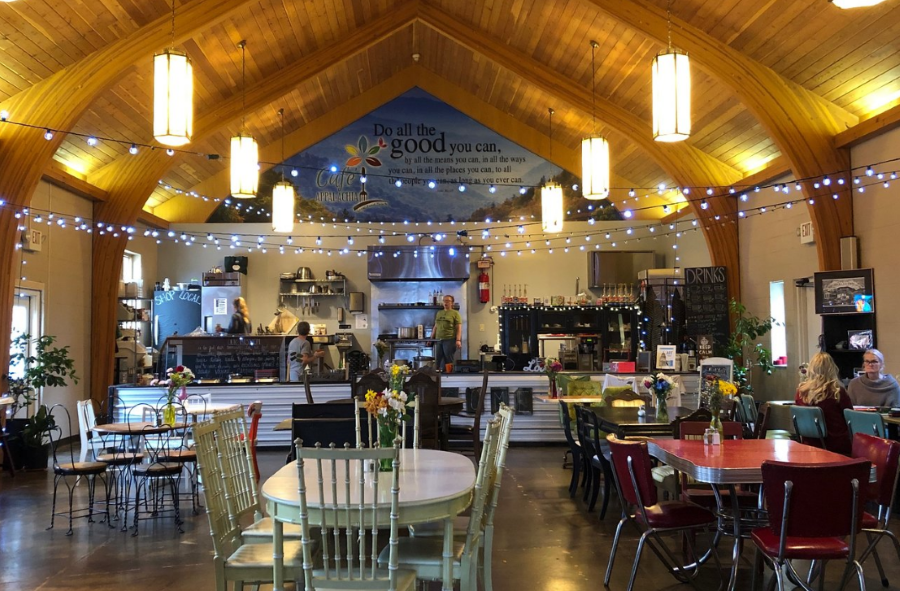Creatively Letting Go
Creatively Letting Go
By Caleb Rollins
Years ago, the children of St. John’s United Methodist Church in South Charleston, West Virginia, gathered for games and fun in a small area adjacent to their sanctuary at the edge of downtown. Today, a vegetable garden sits on that plot of land providing produce for the café now run out of the former church building. Café Appalachia, a pay-what-you-can coffee shop and restaurant, opened in the old worship space in 2018. Part of the organization Pollen8, Cafe Appalachia also trains and employs women recovering from substance misuse. The journey to this social enterprise coming to occupy an old Methodist building began years ago and required a mixing of cultures and financial sources to come to fruition.
The building of St. John’s actually belonged to St. Paul’s United Methodist Church, which had come to own it through a series of mergers over the last fifteen years. The general decline of attendance and financial security at several local congregations led to an opportunity familiar to many consolidated congregations. They now held an extra piece of real estate, but they had to maintain it and decide how they might steward it to further their mission. With the central location of the former St. John’s plot, St. Paul’s had the opportunity to sell this land and gain a substantial sum of money and provide some security to daily operations. According to St. Paul’s pastor Rev. Paul Mateer, the congregation had conversations with a restaurant that wanted to purchase the parcel for about $200,000.
However, the congregation maintained active relationships with many nonprofit organizations and hosted community meals. Through this community engagement, they met Cheryl Laws, the founder and CEO of Pollen8. Laws presented to them her vision of Café Appalachia, where all people could come to eat and women recovering from substance misuse could more easily reintegrate into society. The old church building would serve as a perfect site for this new social enterprise, but St. Paul’s would have to give it to Pollen8 for little to no cost.
In discerning whether they wanted to invest in the mission of this nonprofit, the congregation came to know some of the women engaged in Pollen8’s programming. These women, who would be the ones working in the proposed café, did not match the typical demographics of the congregation. Through small efforts of relationship-building though, any concerns about the cultural differences between the church and the nonprofit were allayed. Even with the strengthening bond between the congregation members and women of Pollen8, the church still had to determine whether they could afford to sacrifice a six-figure windfall to support the dream of Café Appalachia.
Leaning on the expertise of the members of their congregation and the resources of their conference, St. Paul’s came up with a compromise. Rather than give the old church building to Café Appalachia, the congregation would apply for some grants to help substitute for some of the potential revenue from selling the land to the highest bidder. Through a grant from their conference, a denominationally affiliated foundation, and a few other small sources, the congregation raised $45,000. While this amount did not equal the $200,000 offer they had previously received, it eased the concerns of the congregation’s trustees enough for them to move forward in partnership with Café Appalachia.
This process of relationship building and piecing together the right financial components did not happen overnight. Yet, through the investment of time and energy by many in their congregation and beyond, St. Paul’s United Methodist Church used their extra church building to support a nonprofit focused on one of the most urgent and challenging social problems in their community.
This story is part of Lake Institute’s story collection, the Faithful Generosity Story Shelf, which highlights congregations and other religious organizations who have sought to use their assets and resources in creative—and sometimes surprising—ways as an expression of faithful giving.
Each entry in our Story Shelf is short enough to be read and discussed during a committee meeting or other group gathering. Our hope is that these accessible vignettes will spark new questions, conversation, and imagination among clergy and laity about what might be possible with the funds, buildings, land, and other resources in their care. If you know a story that should be included in the Story Shelf, suggest it here.
Subscribe
Insights is a bi-weekly e-newsletter for the religious community and fundraisers of faith-based organizations that provides:
- Reflections on important developments in the field of faith and giving
- Recommended books, studies and articles
- Upcoming Lake Institute events

